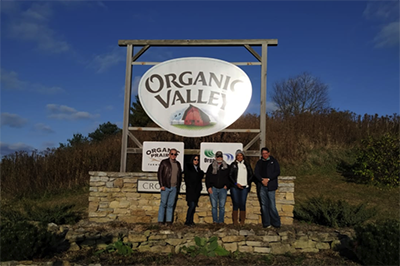
Taste, environmental concerns, and the desire to consume foods free of chemical pesticides or grown without conventional fertilizers are among the many reasons a growing number of consumers prefer to buy organic food products.
The global organic food and beverage market is expected to reach USD $211.44 billion by 2020, growing at a Compound Annual Growth Rate (CAGR) of 15.7 percent from 2014 to 2020. Dominican livestock farmers are quickly realizing that they not only don’t want to be left behind, but that they have a unique opportunity to take advantage of their current practices and resources to access the certified grass-fed/organic market.
In organic livestock farming (poultry, meat, dairy and eggs), farms are expected to provide animals with natural living conditions and feed. Organic certification verifies that livestock are raised according to the U.S. Department of Agriculture (USDA)’s organic regulations. Organic livestock is treated with medicine when sick, but drugs are not used to promote growth. Additionally, their feed must be organic, and they are required to consume 30 percent of their diet from pasture for a minimum of 120 days per year.
Organically raised livestock are raised without the use of conventional antibiotics. Farmers cannot withhold emergency conventional treatment if the life of the animal is endangered, but that animal can no longer be included in the herd as part of the organic production.
The Dominican Association of Beef Producers (ASOCARNE) and various Dominican producers have expressed interest in establishing a niche market for the production of certified organic and/or grass-fed beef and dairy products. To support this promising initiative, NCBA CLUSA’s Safe Agriculture/Food Export (SAFE) Project, funded through USDA’s Foreign Agriculture Service, established an agreement to facilitate a series of educational exchanges with Organic Valley—one of the most successful small farmer-owned dairy cooperatives in the world—to take advantage of their experience in organic and grass-fed beef and dairy farming. Dominican producers and technicians and Organic Valley partners and suppliers shared experiences in certified organic/grass-fed livestock production, cooperative governance, and other topics relevant to the development of an organic beef and dairy market in the Dominican Republic.
CROPP Cooperative, whose commercial brands include Organic Valley, was started in 1988 by nine producers. Today, the organization counts 2,000 farmer-members and sales exceeding $1 billion. Eighty-six percent of CROPP’s member-owners have herds of fewer than 100 cows with an average herd size of 71 cows.
As part of the agreement between the Dominican Association of Beef Producers and Organic Valley, SAFE recently visited Organic Valley’s main office in La Farge, Wisconsin. Fabio Alonzo (Dominican beef producer), Enrique de Castro (Dominican beef producer and SAFE Value Chain leader) and Nelson Almonte (SAFE Regional Coordinator) participated in the visit, in coordination with Silvia Abel-Caines, Staff Ruminant Nutritionist for Organic Valley, and Jim Wedeberg, Vice President for International Cooperative Development for the co-op. During the visit, Organic Valley showcased what it means to have—and how to foster—a cooperative culture, as well as which strategic methods they use to lead the organic market. One of the key takeaways from Organic Valley’s experience is how they push for the fixed base price so that the producers can obtain the highest possible selling price.
According to Silvia, “fostering and strengthening the collaboration between cooperatives is one of the foundational principles of cooperativism. Organic Valley is excited about collaborating with ASOCARNE and PROGANA to promote not only a holistic and sustainable way of farming in the Dominican Republic, but also the opportunity to support family farms.”
Additionally, Organic Valley officials demonstrated the certification process for organic products administered by the National Organic Program (NPO). The importance of record-keeping was highlighted during the organic certification presentation: in order to begin the process, the producer must provide a summary of cultivated items, field maps and inventories of used materials and processed crops. The process of organic certification lasts at least three years and is based on an honor system. In parallel with the office visit, the SAFE team visited various Organic Valley member farmers that use a variety of production techniques, all focused on organic production. This common denominator has allowed them to be at the cutting edge of both marketing and market development of organic meat and dairy products.
The farm visits allowed participating Dominican beef producers to see the potential in existing small and medium-size cattle farms in their country to be both profitable and sustainable.
“Organic Valley is a living example of what small farmers can do with vision and hard work. In a country where most farms range between 30 to 50 cows, it is encouraging what a group of farmers of similar size herds have been able to build in 20 years,” de Castro said.
“Organic Valley is a living example of what small farmers can do with vision and hard work. In a country where most farms range between 30 to 50 cows, it is encouraging what a group of farmers of similar size herds have been able to build in 20 years.” – Enrique de Castro, Dominican beef producer
After this informative visit, the next step will be to coordinate a meeting between Organic Valley representatives and Dominican livestock producers interested in taking advantage of the growing organic product market, and to incentivize the transformation of their traditional farms. Additionally, Wederberg and Abel-Caines will work hand-in-hand with SAFE to promote the culture of cooperativism in Dominican Republic as early as January 2020, as well as to provide expert recommendations on animal nutrition and management for the Dominican livestock value chain.


